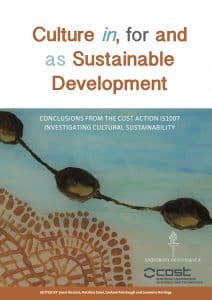Culture In, For and As Sustainable Development: Conclusions from the COST Action IS1007 Investigating Cultural Sustainability

During its four year period (2011-2015) the main objective of The COST Action IS1007 ‘Investigating Cultural Sustainability’ was to highlight European research across its members’ countries in order to provide policy makers with instruments for integrating culture as a key element of the sustainable development.
The Action’s network was composed of around 100 researchers from 25 countries within the EU, with participants as well from Israel, New Zealand and Australia. It held a wide variety of disciplines and fields of research, ranging from cultural, humanistic and social sciences, through political and natural sciences to planning. These were organised in three thematic clusters – Concepts, Policies and Assessments – which are broadly reflected in the structure of the Action’s final report ‘Culture in, for and as Sustainable Development’.
The network built a comprehensive analytical framework that recognises three ‘roles’ of culture in sustainable development. This allows the study and application of ‘culture and sustainable development’ in a structured way.
First, culture can have a supportive and self-promoting role (characterised as ‘culture in sustainable development’). This expands conventional sustainable development discourse by adding culture as a self-standing 4th pillar alongside separate ecological, social, and economic considerations and imperatives.
Second, a role (‘culture for sustainable development’) which offers culture as a more influential force that can operate beyond itself. This role moves culture into a framing, contextualising and mediating mode that can balance all three of the existing pillars and guide sustainable development between economic, social, and ecological pressures and needs.
Third, a more fundamental role (‘culture as sustainable development’) which sees culture as the necessary overall foundation and structure for achieving the aims of sustainable development.
In all three roles, the recognition that culture is at the root of all human decisions and actions and an overarching concern (even a new paradigm) in sustainable development thinking, causes culture and sustainability to become mutually intertwined; the distinctions between the economic, social and environmental dimensions of sustainability thus begin to fade.
–
Dessein, J., Soini, K., Fairclough, G., Horlings, L., Battaglini, E., Birkeland, I., Duxbury, N., De Beukelaer, C., Matejic ́, J., Stylianou-Lambert, T., Mihailova, M., Spinozzi, P., Cicerchia, A., Johannisson, J., Kangas, A., Lapka, M., Dragicevic-Sesic, M., Siivonen, K., Skjerven, A., Plebanczyck, K., Tomka, G., Bender, O., Leus, M., Palang, H., Parra, C., Burton, R., Brites, C., Atmanagara, J., Kivitalo, M., Svane-Mikkelsen, N., Blanc, N., Freitas, R., Cadarso, M., Hristova, S., Lang, M., Chiarini, R., Chudlinov, E., Reimer, M. (2015) “Culture in, for and as sustainable development: Conclusions from the COST Action IS1007 Investigating Cultural Sustainability,” Jyväskylä: University of Jyväskylä.
